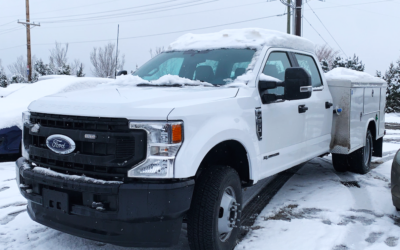Get Your Fleet Tires Winter-Ready
Winter is here and as always it has brought many potential fleet safety issues for drivers who have to take your fleet vehicles on snow-covered roads. Many fleets make the smart decision to invest in advanced safety features to ensure fleet safety and to prolong the life of their vehicles during winters. They make sure to invest in the best stability systems, brake systems, and advanced driver assistance to keep their fleet on the road.
However, even the best technology can’t save your vehicle, if you don’t invest in winter-ready tires. You can make your tires winter-ready by simple education and training. If your tires are prepared for the wintery season, they can help lower your overall fuel expenditure and keep your fleet out of danger. Moreover, it can also extend the life of your tires.
Here are 6 tips that can help you get winter-ready tires for your fleet vehicles:
1. Maintain Proper Tire Inflation
Optimal tire pressure can extend your tire’s life and also increase your mileage. However, it can be hard to maintain proper tire inflation during the colder months. The tire pressure decreases about 2 to 3 psi for every 10-degree Fahrenheit decline in temperature. Many drivers don’t realize that this drop in tire pressure has an impact on their stopping distance and the overall performance of their vehicle.
To maintain proper tire pressure, you need to check for the most accurate pressure reading. This is why you must check the pressure in your tires first thing in the morning before each job. Also, check the pressure if the vehicle hasn’t been operational for several hours.
2. Look Out for Low Tread
Driving with low tread is generally unsafe, but it can be particularly dangerous during winters. This is because it increases the risk of hydroplaning on wet roads. Moreover, the road surface can rapidly change during winters from ice to sleet to slush. Snow-covered roads can make driving with low tread quite unmanageable for fleet drivers.
Additionally, make sure that you don’t mix treads on the rear axles of fleet vehicles that have dual wheels. This is because it will result in uneven wear and might cause a loss of traction. As for as your steer tires are concerned, they must have a tread depth of at least 4/32 inches, while all of your other tires must have a tread depth of 2/32 inches. You can simply use a tread-depth gauge to check the tread of your fleet trucks and keep your drivers safe while on the road.
3. Ensure Appropriate Tire Balance
Improperly aligned or out-of-balance steer tires can have dire consequences for fleet drivers. These consequences are significantly amplified on snow-covered, slick roads. It can cause excessive vibration in your vehicle, which can lead to a loss of control. It can also cause irregular wear and tear in your tires and reduce their overall life. This is why you must check the alignment of all of your fleet tires before allowing the vehicles to be taken for a job.
4. Be Careful of the Wear and Tear Associated with Winter
Most tire troubles start occurring during the springtime. It’s not because the spring weather is harsh on the health of fleet tires. Instead, it happens due to the wear and tear that they face during winters. When your all-season tires are exposed to cold temperatures for a prolonged time, their chemical compounds start to break down, which results in a loss of elasticity. This leads your tires to become brittle and more prone to excess wear.
Additionally, the condensation from the cold air can gather in your tire valve core. When this dampness and moisture freezes, it expands and creates a gap that enables air to escape from your tires and results in a drop in the tire pressure. So, you must keep an eye out for any wear and tear that your tires might face during the winter months to avoid future troubles.
5. Don’t Forget to Check Your Inner Tires
Fleets that have dual-wheel vehicles need to be super careful about checking the inner tires. Admittedly, it is a bit strenuous to check the tread and pressure of inner tires, but you must include them in your regular inspection. So, if you want winter-ready tires, then make sure to include all the tires of your fleet trucks in your driver’s pre-trip checklist.
They should measure the tread wear and the axle pressure of each tire to ensure that it’s the same on all tires. This is because if one tire has less pressure than the others, it will create needless friction on the tire and result in more wear and tear.
6. Train All Your Drivers to Maintain the Tires on Your Fleet Vehicles
We have already established the importance of appropriate tire pressure in harsh environments during winters. However, most fleet drivers don’t even know how to check the pressure in their tires correctly. Similarly, many fleet drivers don’t know the appropriate inflation for the tires that are affixed to their vehicles. This is quite alarming since a large number of vehicle defect accidents are a result of improper tire pressure and around half the emergency roadside service calls are typically tire-related.
This is why you must make sure that all of your drivers are well-equipped and properly trained to maintain the tires of their vehicles. Also, you need to ensure that proper tire inspection is a regular and essential part of their pre-trip routine. This will help you save your vehicles from future trouble and, more importantly, it will help save lives.
The Bottom Line
Winter-ready tires can help keep your fleet drivers out of harm’s way. To ensure that your tires are ready for winters, train your drivers to inspect them regularly. Make sure to maintain proper tire inflation, balance, and tread as well, and don’t ignore the inner tires in double-wheeled fleet vehicles.
If you follow these tips, then your drivers can safely take your fleet vehicles across the country without any fear. Making sure that your tires are winter-ready isn’t just the right thing to do; it’s also a smart business move that can save your company from potential future costs.





